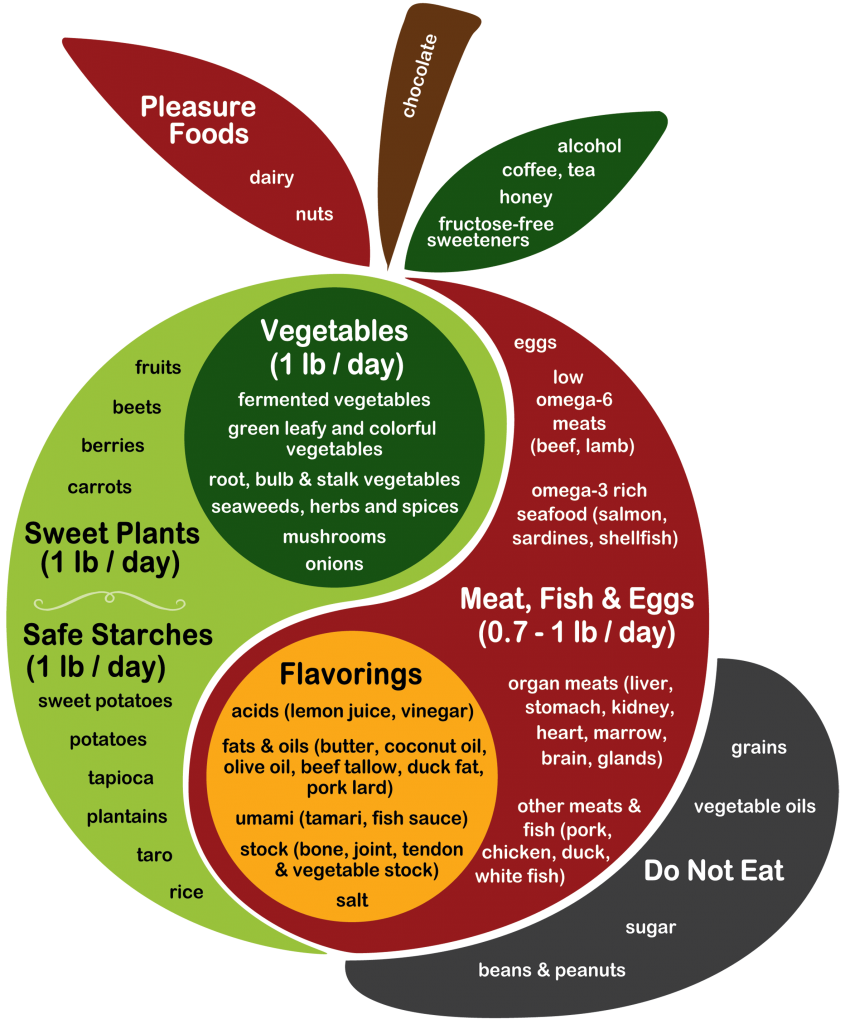The Perfect Health Diet
Here’s our Perfect Health Diet food plate:
NOTE: This is our new food plate, updated 2015. Foreign translations of the original food plate may be found here.
We recommend:
- About 3 pounds [1.4 kg] of plant foods per day, including:
- About 1 pound [0.45 kg] of safe starches, such as white rice, potatoes, sweet potatoes, and taro;
- About 1 pound [0.45 kg] of sugary in-ground vegetables (such as beets or carrots), fruits, and berries;
- Low-calorie vegetables to taste, including fermented vegetables and green leafy vegetables.
- One-half to one pound [0.25 to 0.5 kg] per day of meat or fish, which should include organ meats, and should be drawn primarily from:
- ruminants (beef, lamb, goat);
- birds (especially duck and wild or naturally raised birds);
- Shellfish and freshwater and marine fish.
- Low omega-6 fats and oils from animal or tropical plant sources, to taste. Good sources include:
- butter, sour cream, beef tallow, duck fat;
- coconut milk or oil
- palm oil, palm kernel oil, olive oil, avocado oil, macadamia nut butter, almond butter, cashew butter
- Acids to taste, especially citric acid (lemon juice, lime juice, orange juice, grapefruit juice), lactic acid from fermented or pickled vegetables, vinegars, tannic acids from wine, and tomatoes.
- Broths or stocks made from animal bones and joints.
- Snacks or desserts from our pleasure foods: fruits and berries, nuts, alcohol, chocolate, cream, and fructose-free sweeteners like dextrose or rice syrup.
By weight, the diet works out to about 3/4 plant foods, 1/4 animal foods. By calories, it works out to about 600 carb calories, primarily from starches; around 300 protein calories; and fats supply a majority (50-60%) of daily calories.
In the shadow of the apple are foods forbidden because of their high toxin content. Notably:
- Do not eat cereal grains — wheat, barley, oats, corn — or foods made from them — bread, pasta, breakfast cereals, oatmeal. The exception is white rice, which we count among our “safe starches.” Rice noodles, rice crackers, and the like are fine, as are gluten-free foods made from a mix of rice flour, potato starch, and tapioca starch.
- Do not eat calorie-rich legumes. Peas and green beans are fine. Soy and peanuts should be absolutely excluded. Beans might be acceptable with suitable preparation, but we recommend avoiding them.
- Do not eat foods with added sugar or high-fructose corn syrup. Do not drink anything that contains sugar: healthy drinks are water, tea, and coffee.
- Polyunsaturated fats should be a small fraction of the diet (~4% of total calories). To achieve this, do not eat seed oils such as soybean oil, corn oil, safflower oil, sunflower oil, canola oil, or the like.
We highly recommend certain foods for their micronutrients. These include liver, kidney, egg yolks, seaweeds, shellfish, fermented vegetables, and bone broths.
We also recommend augmenting the diet with certain supplements. See our Supplement Recommendations page. These nutrients are deficient in modern diets due to removal of minerals from drinking water by treatment, depletion of minerals from soil by agriculture, or modern lifestyles that deprive us of vitamin D by indoor living.
We recommend tweaking the diet for certain diseases. Neurological disorders often benefit from a diet that is ketogenic; other conditions may benefit from lower carb diets. These variations are discussed in the book:
See the “Buy the Book” page for other purchase options.












4,034 Comments.